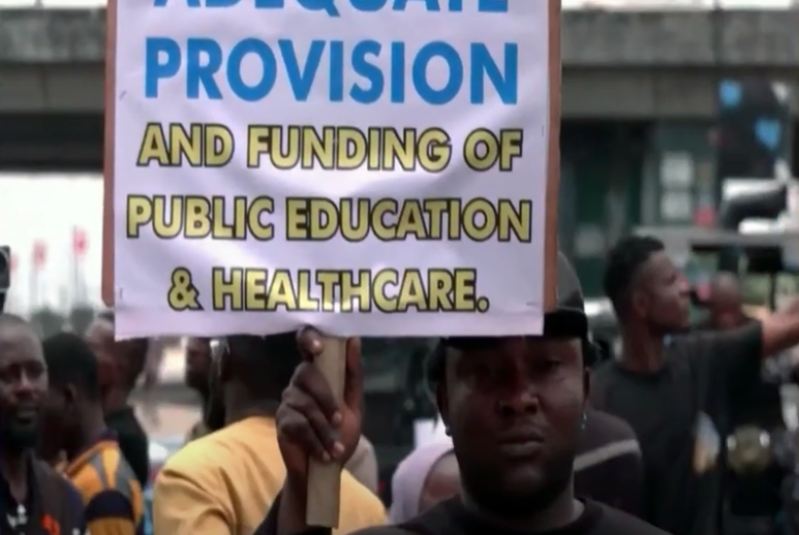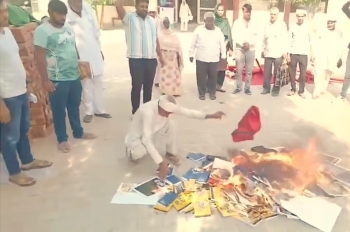
Nigeria’s President Bola Ahmed Tinubu on Sunday, 4 August, 2024, regretted the loss of lives and destruction of property following protests that rocked the West African nation since August 1.
In a nationwide broadcast, Tinubu said he was saddened that the protests had turned violent in some states including Borno, Jigawa, Kano and Kaduna. The police reported that 17 people had died from the nationwide #EndBadGovernance protests. There were also several incidents of looting and destruction of property.
“I speak to you today with a heavy heart and a sense of responsibility, aware of the turmoil and violent protests unleashed in some of our states. I commiserate with the families and relations of those who have died in the protests. We must stop further bloodshed, violence and destruction,” said Tinubu.
While acknowledging the protesters demands of accountability and transparency in the governance of the nation, Tinubu said he was alive to the fact that young Nigerians desire a better and more progressive country where “their dreams, hopes, and personal aspirations would be fulfilled.” Protesters also demanded that the government addresses the rising cost of living that has seen inflation rise to a 28-year high of 34%.
The high inflation has been linked to Tinubu’s policies that removed fuel subsidies leading to significant increase in transportation costs and an upward adjustment on prices of goods and services. In his televised address to the nation, Tinubu acknowledged that his administration’s policies had adverse impact on people's livelihood but he justified his administration's actions as ‘necessary’ to recalibrate the economy towards growth.
“For decades, our economy has remained anaemic and taken a dip because of many misalignments that have stunted our growth. Just over a year ago, our dear country, Nigeria, reached a point where we couldn’t afford to continue the use of temporary solutions to solve long-term problems for the sake of now and our unborn generations. I therefore took the painful yet necessary decision to remove fuel subsidies and abolish multiple foreign exchange systems which had constituted a noose around the economic jugular of our Nation and impeded our economic development and progress,” explained the president.
Religious leaders also urged organizers to call off the 7-day protest and give dialogue a chance. Archbishop Daniel Okoh, President, Christian Association of Nigeria (CAN) and Sultan Muhammed Sa’ad Abubakar, leader of Nigerian Muslims, in a joint statement published on August 2, on behalf of Nigeria Inter-Religious Council (NIREC), called for immediate end to the protests and urged the Nigerian government to address issues raised by protesting citizens.
”It is without doubt that there is hunger and hardship in the country but civil unrest is not the solution as it would only further aggravate the already frail state of the nation. In just one day, lives and enormous amounts of property have been destroyed. Imagine if this continues for a prolonged period of time, only God knows the extent of damage that would be incurred,” cautioned NIREC.
“We call on the security agencies to be more professional in the discharge of their duties, while the government expedites action towards meeting the yearning and needs of the citizens. We need a peaceful and tranquil nation we can be proud to call our own,” the religious leaders said.
Sydney Usman, one of the leaders of the “Take It Back Movement,” a civil society organization involved in the protests, said while Nigerians appreciate the role of religious leaders, the civil society preferred to enter into dialogue with NIREC as a first step towards engaging in talks with the Nigerian government. Protests continued on the fifth day after the appeal by the president and religious leaders but at a much reduced scale limited to the commercial capital Lagos and some northern states.
Tinubu assured Nigerians that the government was on track to reverse years of economic mismanagement. He cited several initiatives and policy changes that had started to bear fruit. The introduction of automation had doubled government revenues in the first half of 2024 while at the same time reducing the percentage of revenue spent on debt repayments, Tinubu said.
Additionally, Tinubu said the government has increased the budget allocation to State governments and national infrastructure projects, created a student loan scheme and rolled out an ambitious social housing program that will add over 100,000 houses in the next 3 years.
“Yes, I agree, the buck stops on my table. But I can assure you that I am focused fully on delivering the governance to the people - good governance for that matter,” said Tinubu.





